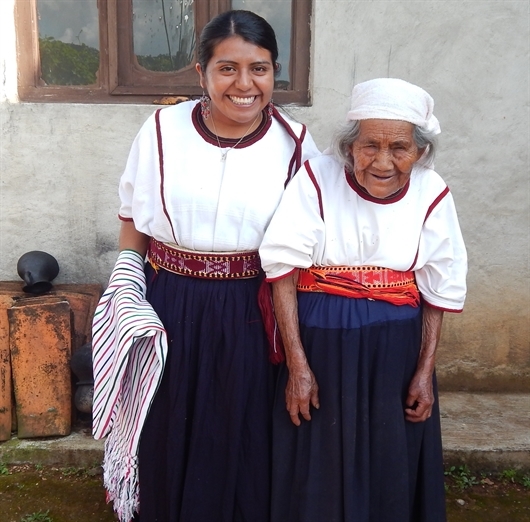Three years ago, before Tania Eulalia Martínez left Mexico to pursue a doctorate in Holland, her Abuelita Eulalia had one request: “Take this shawl with you. I want you to tell those who live over there, in that other world, who we are, how we live, and what we do. Take it so that you can remember us, so that you don’t forget us.” But what the late Eulalia may not have realized at the time is that Tania’s studies would bring her closer to the Mixe community. As she pursues a Ph.D. at Wageningen University in the Netherlands, Tania’s devoted to improving the lives of Mexico’s indigenous populations.
“I feel committed to giving something back to my country, and the area where I can do it is in the agricultural sector,” she said. “The technical background is important, but so are the social aspects. I want to help agricultural projects reach more people who have been marginalized, and to do so, I have to better understand the social and cultural contexts in which these projects take place. I want not just to create technologies and techniques to solve problems, but to understand the lives of indigenous peoples and farmers, so I can be more efficient as a scientist in helping them. I am an engineer learning to be a social scientist.”
“When you’re born, your ombliguito must be buried in your home’s yard, because that’s where you belong.”
Tania’s story begins in the Sierra Mixe in Oaxaca. But to truly understand her, you also need to understand her parents and her abuelita.
Abuelita Eulalia became a mother at 14 and didn’t have the opportunity to receive an education. But Tania credits her always hard working grandmother for passing on her wisdom and shaping her worldview. Without her abuelita, Tania wouldn’t be the person she is today. It’s her grandmother who taught her that life comes full circle. “She said that when you’re born, your ombliguito must be buried in your home’s yard, because that’s where you belong,” Tania said. “And where you have to return one day to end the cycle of your life.” From Eulalia, Tania learned to cultivate the land and the importance corn has in her community.

Tania’s parents also faced their own hardships growing up. Both left their homes at young ages to escape poverty and to receive an education. They ended up becoming teachers – one of the first generations of indigenous teachers in Mexico. Her mother, who learned Spanish when she moved to Mexico City at age 9, originally wanted to work in the medical field. Instead, her parents traveled from school to school and taught indigenous students in both Spanish and Mixe.
Like her parents, Tania made the difficult decision to leave her home at age 14. With alcoholism and violence plaguing her family and a lack of educational opportunities, she moved to Texcoco for high school, because her town didn’t have one. She then qualified for a spot at la Universidad Autónoma Chapingo (UAch).
Perhaps she could have settled into her life after finishing school. She worked as a research assistant, consultant and irrigation specialist for the UAch, but she wanted to help indigenous communities. She quit her job and prepared for one of the most arduous tasks of her life: getting a scholarship so she could obtain her master’s degree in the United States. To do so, she needed to prove she had a certain level of mastery over the English language, so she hit the public library to study. Using her last bit of money, she took the Graduate Record Examination (GRE). She initially didn’t receive her scores in time but refused to despair. That’s how she went on to become Mexico’s first indigenous recipient of the Fulbright-García Robles Scholarship. She continued her studies at the University of Arizona.
“My UA degree expanded my research and knowledge, particularly in using irrigation for bioethanol production,” she said, according to UA’s site. “I also gained confidence in a second language, and in my skills as a researcher, thanks to an excellent supervisor [Donald Slack] who motivated and supported me.” Slack describes Tania as “the best graduate student I have ever had,” and he was so impressed with her, that he invited her to join him at an engineering conference in Thailand.
https://www.youtube.com/watch?v=a1A7HZM70vc
Now, she’s about three-quarters of the way through her Ph.D. program, and she continues racking up well-deserved prizes. In August, she earned el Premio Nacional de la Juventud 2016 for her academic achievements, where she delivered an incredibly touching speech about her roots wearing her striped shawl. Her grandmother, unfortunately, was not alive to see it.
Tania’s future is promising to say the least, but the young woman has no idea where life will lead her next. All she can be certain of is that her ombliguito will be waiting.







